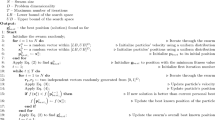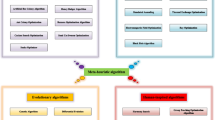Abstract
As one kind of the classic swarm intelligence (SI) algorithms, fruit fly optimization algorithm has been widely used in many aspects, such as multiple objective optimization and service computing. However, due to the limitation that introduced by the initial population location, its global optimization ability is limited. Therefore, we propose a random walk-based fruit fly optimization algorithm, namely RWFOA, to enhance its global optimization ability. RWFOA employs the random walk mechanism to dynamically adjust the position of the fruit fly population, which can reduce the impact of the initial population location and thus enhance the global optimization ability. We conduct a comprehensive experimental evaluation of RWFOA by comparing it with three representative algorithms, i.e., the OFOA, CFOA and IFFO, over 29 widely used benchmark functions published in CEC 2015. Experimental results demonstrate that RWFOA can find better solutions in most of the selected benchmark functions.



Similar content being viewed by others
References
Al-Betar MA, Awadallah MA, Doush IA, Hammouri AI, Mafarja M, Alyasseri ZAA (2019) Island flower pollination algorithm for global optimization. J Supercomput 75(8):5280–5323
Arora S, Singh S (2019) Butterfly optimization algorithm: a novel approach for global optimization. Soft Comput 23(3):715–734
Awadallah MA, Al-Betar MA, Bolaji AL, Alsukhni EM, Al-Zoubi H (2019) Natural selection methods for artificial bee colony with new versions of onlooker bee. Soft Comput 23(15):6455–6494
Babalık A, İşcan H, Babaoğlu İ, Gündüz M (2018) An improvement in fruit fly optimization algorithm by using sign parameters. Soft Comput 22(22):7587–7603
Chen M, Yan Y (2014) Qos-aware service composition over graphplan through graph reachability. In: 2014 IEEE international conference on services computing. IEEE, pp 544–551
Deng W, Xu J, Zhao H (2019) An improved ant colony optimization algorithm based on hybrid strategies for scheduling problem. IEEE access 7:20281–20292
Ding Y, Zhang W, Yu L, Lu K (2019) The accuracy and efficiency of GA and PSO optimization schemes on estimating reaction kinetic parameters of biomass pyrolysis. Energy 176:582–588
Drigo M (1996) The ant system: optimization by a colony of cooperating agents. IEEE Trans Syst Man Cybern B 26(1):1–13
Grefenstette J (2000) Proportional selection and sampling algorithms. Evol Comput 1:172–180
Hewitt M, Chacosky A, Grasman SE, Thomas BW (2015) Integer programming techniques for solving non-linear workforce planning models with learning. Eur J Oper Res 242(3):942–950
Higle JL, Sen S (2013) Stochastic decomposition: a statistical method for large scale stochastic linear programming, vol 8. Springer, Berlin
Kim TH, Lee KM, Lee SU (2008) Generative image segmentation using random walks with restart. In: European conference on computer vision. Springer, pp 264–275
Li HZ, Guo S, Li CJ, Sun JQ (2013) A hybrid annual power load forecasting model based on generalized regression neural network with fruit fly optimization algorithm. Knowl-Based Syst 37:378–387
Li JQ, Pan QK, Mao K (2015) A hybrid fruit fly optimization algorithm for the realistic hybrid flowshop rescheduling problem in steelmaking systems. IEEE Trans Autom Sci Eng 13(2):932–949
Liang J, Qu B, Suganthan P, Chen Q (2014) Problem definitions and evaluation criteria for the CEC 2015 competition on learning-based real-parameter single objective optimization. Technical Report 201411A, Computational Intelligence Laboratory, Zhengzhou University, Zhengzhou China and Technical Report, Nanyang Technological University, Singapore, vol 29, pp 625–640
Liu D, Trajanovski S, Van Mieghem P (2015) Iligra: an efficient inverse line graph algorithm. J Math Modell Algorithms Oper Res 14(1):13–33
Liu X, Wang W, Guo Z, Wang C, Tu C (2019) Research on adaptive SVR indoor location based on GA optimization. Wirel Pers Commun 109:1095–1120
Mavrovouniotis M, Li C, Yang S (2017) A survey of swarm intelligence for dynamic optimization: algorithms and applications. Swarm Evolut Computa 33:1–17
Meng T, Pan QK (2017) An improved fruit fly optimization algorithm for solving the multidimensional knapsack problem. Appl Soft Comput 50:79–93
Mitchell M (1998) An introduction to genetic algorithms. MIT Press, Cambridge
Mitić M, Vuković N, Petrović M, Miljković Z (2015) Chaotic fruit fly optimization algorithm. Knowl-Based Syst 89:446–458
Pan QK, Sang HY, Duan JH, Gao L (2014) An improved fruit fly optimization algorithm for continuous function optimization problems. Knowl-Based Syst 62:69–83
Pan WT (2012) A new fruit fly optimization algorithm: taking the financial distress model as an example. Knowl-Based Syst 26:69–74
Parreño-Torres C, Alvarez-Valdes R, Ruiz R (2019) Integer programming models for the pre-marshalling problem. Eur J Oper Res 274(1):142–154
Seghir F, Khababa A (2018) A hybrid approach using genetic and fruit fly optimization algorithms for qos-aware cloud service composition. J Intell Manuf 29(8):1773–1792
Shan D, Cao GH, Dong HJ (2013) LGMS-FOA: an improved fruit fly optimization algorithm for solving optimization problems. Math Problems Eng 37:1–9. https://doi.org/10.1155/2013/108768
Shi Y, Eberhart RC (2001) Fuzzy adaptive particle swarm optimization. In: Proceedings of the 2001 congress on evolutionary computation (IEEE Cat. No. 01TH8546). IEEE, vol 1, pp 101–106
Shi Y et al (2001) Particle swarm optimization: developments, applications and resources. In: Proceedings of the 2001 congress on evolutionary computation (IEEE Cat. No. 01TH8546). IEEE, vol 1, pp 81–86
Tang Y, He H, Wen J, Liu J (2014) Power system stability control for a wind farm based on adaptive dynamic programming. IEEE Trans Smart Grid 6(1):166–177
Taylor CR (2019) Applications of dynamic programming to agricultural decision problems. CRC Press, Boca Raton
Wang L, Xiong Y, Li S, Zeng YR (2019) New fruit fly optimization algorithm with joint search strategies for function optimization problems. Knowl-Based Syst 176:77–96
Wu L, Zuo C, Zhang H (2015) A cloud model based fruit fly optimization algorithm. Knowl-Based Syst 89:603–617
Zhang Y, Cui G, Deng S, He Q (2016) Alliance-aware service composition based on quotient space. In: IEEE international conference on web services. IEEE, pp 340–347
Zhang Y, Cui G, Wang Y, Guo X, Zhao S (2015) An optimization algorithm for service composition based on an improved FOA. Tsinghua Sci Technol 20(1):90–99
Zhang Y, Cui G, Wu J, Pan WT, He Q (2016a) A novel multi-scale cooperative mutation fruit fly optimization algorithm. Knowl-Based Syst 114:24–35
Zhang Y, Cui G, Zhao S, Tang J (2016b) IFOA4WSC: a quick and effective algorithm for QoS-aware service composition. Int J Web Grid Serv 12(1):81–108
Zhang Y, Cui G, Zhu E, He Q (2016c) AFOA: an adaptive fruit fly optimization algorithm with global optimizing ability. Int J Artif Intell Tools 25(06):1650032
Author information
Authors and Affiliations
Corresponding author
Ethics declarations
Conflict of interest
The authors declare that they have no conflict of interest.
Ethical approval
This article does not contain any studies with human participants or animals performed by any of the authors.
Additional information
Communicated by V. Loia.
Publisher's Note
Springer Nature remains neutral with regard to jurisdictional claims in published maps and institutional affiliations.
Rights and permissions
About this article
Cite this article
Chen, C. RWFOA: a random walk-based fruit fly optimization algorithm. Soft Comput 24, 12681–12690 (2020). https://doi.org/10.1007/s00500-020-04830-x
Published:
Issue Date:
DOI: https://doi.org/10.1007/s00500-020-04830-x




